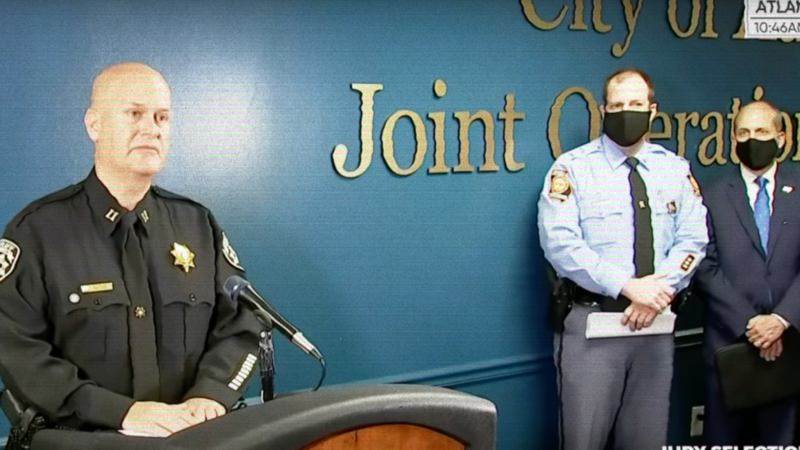The Media Got It Wrong: Police Captain Didn't Say the Atlanta Spa Killer Was Having a 'Bad Day'
The full video shows that Jay Baker was paraphrasing what Robert Aaron Long told investigators about his motivations.

A moment from the Cherokee County Sheriff's Office press conference on Wednesday quickly went viral: Jay Baker, a spokesperson for the police department handling the investigation into the horrific Atlanta spa murders, said that suspect Robert Aaron Long was having a bad day.
"He was pretty much fed up, kind of at the end of his rope, and yesterday was a really bad day for him and this is what he did," said Baker.
The comment struck many people as overly sympathetic toward Long, as if Baker was making excuses for someone who stands accused of killing six Asian-American women in cold blood. A 20-second video clip of Baker's statement was shared on Twitter by Vox journalist Aaron Rupar and swiftly went viral, earning widespread condemnation. Many saw it as evidence that cops are desperate to discount the culpability of white male criminals. For instance, Kimberlé Crenshaw, a law professor and inventor of the term "intersectionality," described Baker's comments as "bone-chilling," and castigated him for refusing to acknowledge "the misogynistic dimensions of anti-Asian racism."
A police officer excusing Long's actions as merely the result of him having a "bad day" would indeed be contemptible. But that's not what Baker did. In fact, many of the people so infuriated about the quote were misled by Rupar's edit of the video.
The full video (the relevant section starts at about 13:50) makes clear that Baker was not providing his own commentary, but rather summarizing what Long had told the investigators. The "bad day" line was proceeded by a clarification that this was Long's own explanation, as related to the police. Baker did not endorse it.
Nor did the captain endorse Long's statement that the killings were unrelated to racism. He makes clear he's relaying comments from Long. "He claims that—and as the chief said this is still early—but he does claim that it was not racially motivated," said Baker. Again, the police spokesman is telling reporters what Long said, not applying his own spin. Later, when another reporter asked about this, Baker stepped aside so that Atlanta Mayor Keisha Lance Bottoms could explain the efforts being undertaken to protect Asian Americans at this time of heightened concern.
It would be naive of the police—or the public, or anyone else—to accept what alleged killers say at face value. It's similarly naive to assume that the sex and ethnicity of the victims tells us everything we need to know about the crime. The police should investigate the matter dispassionately, and relay to the public whatever information they gather. Too often, law enforcement uses such press conferences to engage in wild speculation; this was a refreshing example of the cops not doing that.
But media coverage of the "bad day" comment gave almost zero indication that it was a paraphrase of Long's confession. The Washington Post, for instance, wrote about Baker being taken off the case and used this headline: "Captain who said spa shootings suspect had 'bad day' no longer a spokesman on case, official says." The article's introduction contains no context, and incorrectly parrots Rupar's bad framing:
The backlash began with the sheriff spokesman's statement to reporters that the mass shooting suspect was having a "bad day."
"He was pretty much fed up and kind of at the end of his rope. Yesterday was a really bad day for him and this is what he did," Cherokee County Sheriff's Office Capt. Jay Baker said Wednesday. He was describing the 21-year-old man accused of killing eight people, mostly Asian and almost all women, in a rampage across three Atlanta-area spas.
The New York magazine and BuzzFeed News versions of the story repeated the error.
Baker is no longer the spokesperson for this case, and he is also under fire for previously posting a picture in a shirt that read "Covid 19: Imported virus from CHY-NA." The big issue here is not really that Baker got a raw deal—he may well be ill-suited to serve as a police spokesman—but that countless mainstream journalists, beginning with Rupar, engaged in malpractice. They manipulated readers and viewers to be outraged about something that isn't actually outrageous.
This matters because social media platforms have recently come under tremendous fire from both well-regarded journalists and Democratic lawmakers who assert that Facebook, Twitter, YouTube (and even Clubhouse) allow misinformation to spread unchecked. In mainstream circles, it is now common to believe that Big Tech must be compelled to take stronger action against misleading news.
But this view elides all the ways in which the traditional media spreads misinformation—and this story is a perfect example. Numerous writers, in their zeal to assert that the spa killings were absolutely, positively the result of anti-Asian racism, wrongly dinged a police officer for declining to provide support for this theory.
Baker's performance in the press conference was skewered due to a misleading clip widely circulated by the very same journalists who assert that the loss of the mainstream media's information-gatekeeping function is a serious threat to democracy. It's hard to take these people seriously when they continue to make such mistakes.


Show Comments (101)